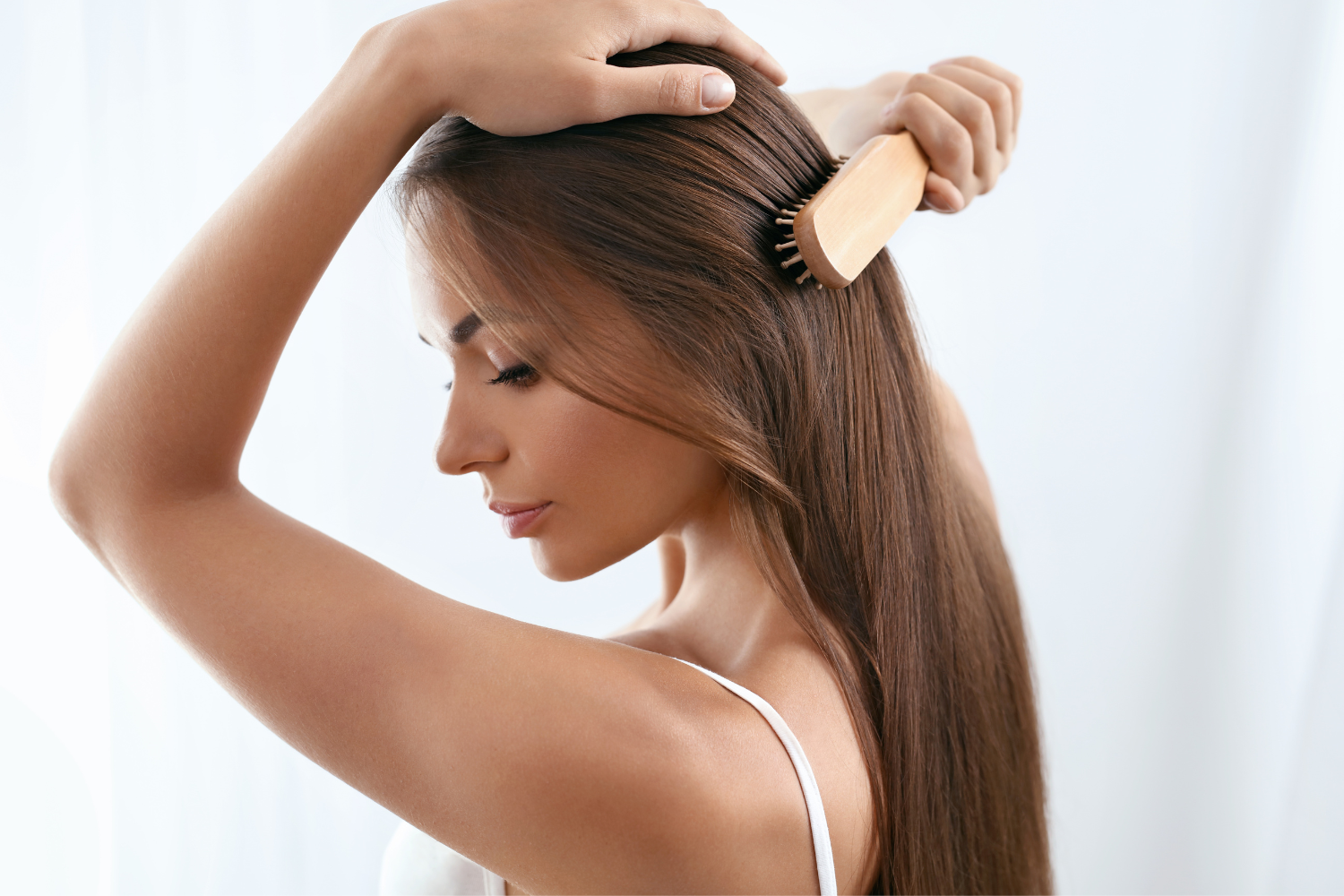As consumers increasingly focus on holistic wellness and outward appearance, demand for beauty-from-within supplements continues to grow. Products targeting skin, hair, and nails are positioned to meet this demand by supporting the body from the inside out with key nutrients that influence cell health, collagen production, and overall appearance.
Supplements that nourish skin cells, strengthen nails, and support the structure of one’s hair offer a practical solution for addressing visible signs of aging, dry skin, and thinning strands. For nutrition brands, developing high-quality products that promote the skin’s protective barrier, connective tissue, and the three layers of the epidermis presents a clear opportunity to appeal to beauty-conscious and health-focused consumers looking for effective, daily support.

Table of Contents
ToggleUnderstanding Skin, Hair, & Nails Supplements
Skin, hair, and nails supplements are products designed to support the health and appearance of the body’s outer features. These supplements often include vitamins, minerals, and proteins that provide nutrients commonly associated with healthy skin, nails, and hair.
They play a key role in beauty routines by helping to fill nutrient gaps that may lead to dry skin, weak nails, or thinning hair. When taken regularly, these supplements can support overall wellness and the body’s natural processes related to keratin and collagen production—components that give skin shape and help hair and nails grow properly.

Common Use Cases
These supplements serve multiple functions beyond appearance, targeting the root causes of visible changes linked to stress, aging, or nutritional gaps.
- May help improve skin appearance associated with aging, such as reduced firmness or fine lines.
- Reducing hair thinning and promoting wavy hair or straight hair growth, depending on genetics and health.
- Strengthening brittle nails and improving their smoothness, shine, and overall appearance.

Common Types of Skin, Hair, & Nails Supplements
Skin, hair, and nails supplements come in several forms to meet the needs of different users and delivery preferences. Brands can choose from various product types to best suit their target audience and retail strategy.
Popular Formats:
- Capsules/Tablets: Easy to take and packed with essential nutrients like biotin, vitamin C, and collagen.
- Powders: Can be added to food or drinks, often combining minerals, protein, and amino acids to support the three layers of the skin.
- Gummies: A flavorful choice that appeals to younger consumers or those who dislike swallowing pills.
- Liquid Supplements: Fast-absorbing and ideal for delivering concentrated nutrients like hyaluronic acid and antioxidants through the bloodstream.

Benefits of Offering Skin, Hair, & Nails Supplements
Adding beauty supplements to a product lineup allows brands to meet growing interest in wellness and appearance. These products support internal health and visible results, making them attractive to today’s consumers.
Meeting Consumer Demand for Holistic Beauty
More people are turning to natural solutions that support beauty from within. Instead of relying only on creams or treatments, consumers are using supplements to improve their skin, hair, and nails through nutrition.
These supplements fit easily into daily self-care routines. They support skin cells, the body’s protective barrier, and help reduce signs of aging—all while becoming part of broader wellness habits.
Expanding Product Lines for Beauty and Wellness
Beauty supplements align well with other health categories. Products focused on aging, stress, or sleep often share similar nutrients, such as collagen or minerals that support the skin and body.
Brands can bundle these supplements with detox, hydration, or immunity-focused formulas. This creates a more complete wellness offering and adds value to product lines without major manufacturing or sourcing changes.
Building Brand Credibility with Premium Ingredients
Using proven, high-quality ingredients builds trust with consumers. Ingredients supported by clinical studies—like hyaluronic acid or biotin—can make a product more appealing and reliable.
Certifications such as non-GMO, vegan, or gluten-free add transparency. These labels are essential for consumers looking to support their health and appearance without unwanted additives or allergens.

Key Ingredients in Skin, Hair, & Nails Supplements
Formulas built with effective nutrients help improve skin appearance, support hair growth, and strengthen nails. Including well-researched ingredients also supports strong supplement facts and product credibility.
Skin-Enhancing Ingredients
Collagen peptides support the skin’s structure by improving elasticity and reducing fine lines. They may support connective tissue health and help improve skin elasticity, which could reduce the appearance of wrinkles with regular use.
Hyaluronic acid keeps the skin hydrated by holding moisture in the layers of the epidermis. This helps reduce dry skin and creates a smoother, plumper look.
Hair-Strengthening Nutrients
Biotin supports the body’s natural processes involved in keratin production, which may help maintain healthy hair. This can promote the growth of stronger, healthier hair and reduce breakage due to damage or stress.
Silica, often sourced from bamboo extract, supports the shape and strength of one’s hair. It helps improve texture and may benefit those experiencing dullness or thinning.
Nail-Strengthening Minerals
Zinc supports healthy nail cells and helps prevent brittleness. It plays a role in protein synthesis, which is key to strong nail growth.
Iron deficiency is associated with brittle or ridged nails, so addressing low iron levels may improve nail strength in deficient individuals. It supports red blood cells and oxygen flow to the nail bed.
Antioxidants and Supporting Vitamins
These nutrients help protect the body’s outer layers and support long-term beauty and wellness goals.
- Vitamin C: Helps build collagen and protect skin from sun and environmental damage.
- Vitamin E: Supports scalp health and smooth skin texture.
- Omega-3 Fatty Acids: Known to support skin hydration and are being studied for their potential role in managing inflammatory responses.

Steps for Nutrition Brands to Develop Skin, Hair, & Nails Supplements
Launching a skin, hair, and nails supplement requires more than choosing ingredients. Brands must understand their market, source quality materials, and build a strong product that meets consumer needs.
Conduct Market Research to Identify Consumer Needs
Start by identifying the right audience. Beauty-conscious millennials, aging adults concerned about wrinkles and thinning hair, and busy professionals looking for quick beauty solutions all have different needs.
Look into trends such as collagen supplements for skin elasticity or plant-based ingredients for hair growth. Staying current helps brands create products that match what the market wants.
Source High-Quality Ingredients
Work with suppliers who offer ingredients backed by science and tested by third parties. Nutrients like hyaluronic acid and biotin should meet quality and safety standards.
Use sustainably sourced options, such as marine collagen or bamboo silica, to appeal to consumers who care about the earth and animal welfare.
Formulate for Targeted Beauty Benefits
Blend ingredients that work well together. For example, combining collagen and vitamin C can boost collagen synthesis and help skin stay firm and hydrated.
Offer choices that meet different needs, including gluten-free, vegan, or allergen-free options. These options can support consumers with dietary restrictions or medical conditions.
Design Packaging and Labels for a Beauty Audience
Use simple, clean packaging that fits in with beauty and wellness trends. This can help attract customers who are browsing for skincare or haircare products.
Ensure the label highlights key benefits like “supports skin’s protective barrier” or “helps reduce hair fall.” Add supplement facts that show vitamins, minerals, and other active ingredients.
Launch and Market Strategically
Time your launch around seasons that affect skin and hair health. Promote skin hydration in cold winter months or highlight support for hair growth in the fall when more people notice shedding.
Work with influencers in the beauty space to show how the supplement fits into real routines. This helps demonstrate how the product supports healthy skin, strong nails, and one’s hair over several weeks.

Marketing Strategies for Skin, Hair, & Nails Supplements
To succeed in a competitive market, nutrition brands must connect with consumers through clear education and strategic partnerships.
Educate Consumers About Beauty Nutrition
Use blog posts, videos, and social media to explain how ingredients like collagen, keratin, and vitamins support the body’s three layers of skin and help nails and hair stay strong.
Showcase real results through before-and-after photos or short testimonials. Stories about improvements in skin texture or less breakage in wavy hair can increase trust and interest.
Partner with Beauty and Wellness Influencers
Collaborate with influencers who already talk about skin, hair, and nails. Their audiences will likely be interested in supplements that support beauty from within.
Ask influencers to share how they use the supplement in their daily life. A trusted voice showing consistent use over a few weeks can help show the product’s value.
Offer Value Through Bundles and Subscriptions
Group related products together, such as a collagen powder with a vitamin E supplement for full beauty support. Bundling can increase order size and make the purchase more appealing.
Offer subscription options to encourage long-term use. Since visible results often take several weeks, subscriptions help users stay consistent while building customer loyalty.

Meeting the Demand for Science-Backed Beauty Supplements
Skin, hair, and nail supplements are key in today’s wellness-driven beauty market. As consumer interest grows, brands can create standout products by focusing on evidence-based ingredients and transparent sourcing practices. Developing supplements that align with personal care goals—while ensuring product safety and clear labeling—can help brands earn long-term trust and customer loyalty in a competitive space.
Frequently Asked Questions
What certifications should skin, hair, and nail supplements have?
GMP certification, third-party testing, and allergen-free or vegan certifications as applicable.
How long does it take to develop these beauty supplements?
Typically 6–12 months, including formulation, testing, and regulatory approval.
What are the most popular ingredients in skin, hair, and nail supplements?
Among the top choices are collagen peptides, biotin, hyaluronic acid, and zinc.
Are these supplements safe for daily use?
Most are safe when used as directed, but formulations should adhere to recommended dosages.
Can beauty supplements be combined with other products?
Yes, they pair well with hydration, anti-aging, or detox supplements for comprehensive wellness solutions.
References
- Bragulla, H. H., & Homberger, D. G. (2009). Structure and functions of keratin proteins in simple, stratified, keratinized and cornified epithelia. Journal of anatomy, 214(4), 516–559. https://doi.org/10.1111/j.1469-7580.2009.01066.x
- Dewi, D. A. R., Arimuko, A., Norawati, L., Yenny, S. W., Setiasih, N. L., Perdiyana, A., Arkania, N., Nadhira, F., & Wiliantari, N. (2023). Exploring the Impact of Hydrolyzed Collagen Oral Supplementation on Skin Rejuvenation: A Systematic Review and Meta-Analysis. Cureus, 15(12), e50231. https://doi.org/10.7759/cureus.50231
- National Cancer Institute. (n.d.). Anatomy of the Skin. https://training.seer.cancer.gov/melanoma/anatomy/
- National Institutes of Health. (2024). Alopecia Areata – Hair loss Causes & Living With It. https://www.niams.nih.gov/health-topics/alopecia-areata
- National Institutes of Health. (2022). Biotin – Health Professional Fact Sheet. https://ods.od.nih.gov/factsheets/Biotin-HealthProfessional/
- National Institutes of Health. (2023). Dietary Supplements: What You Need to Know. https://ods.od.nih.gov/factsheets/WYNTK-Consumer/
- National Institutes of Health. (n.d.). Dietary Supplement Label Database (DSLD). https://ods.od.nih.gov/Research/Dietary_Supplement_Label_Database.aspx
- U.S. Food and Drug Administration. (2024). Current Good Manufacturing Practices (CGMPs) for Food and Dietary Supplements. https://www.fda.gov/food/guidance-regulation-food-and-dietary-supplements/current-good-manufacturing-practices-cgmps-food-and-dietary-supplements




